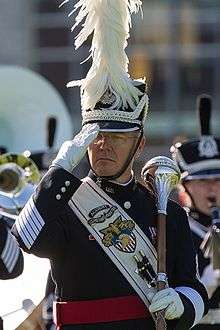191st Army Band
| 191st Army Band | |
|---|---|
 | |
| Active | 1943 – Present |
| Country |
|
| Branch |
|
| Type | military band |
| Role | public duties |
| Size | 45 |
| Part of | 63rd Regional Support Command |
| Garrison/HQ | Camp Parks |
| Nickname(s) | Band of the Wild West |
| Engagements |
Rome-Arno campaign (1944) North Apennines campaign (1945) Po Valley campaign (1945) |
| Decorations |
Army Superior Unit Award |
| Website | http://www.bandofthewildwest.com/ |
| Commanders | |
| Current commander | CWO Jeremy Garrido[1] |
| Insignia | |
| Tab |
 |
The 191st Army Band, the "Band of the Wild West", is a military band of the U.S. Army Reserve posted at Camp Parks, California. Activated in 1943 as the 91st Infantry Division Band, the unit deployed to Europe in World War II where it fought in the Spring 1945 offensive in Italy. It received its current designation as the 191st Army Band in 2008. The 191st Army Band is a subordinate unit of the U.S. Army's 63rd Regional Support Command.
History
Background
The 191st Army Band was activated on August 2, 1943 and was originally known as the 91st Infantry Division Band. The unit was the amalgamation of the 361st Infantry Regiment Band and 91st Infantry Division's Artillery Band, created as a result of the Army's earlier decision to abolish regimental bands in favor of division-level bands. The following year it deployed with the rest of the division to Italy where it participated in the Rome-Arno, North Apennines, and Po Valley campaigns. Over the next 60 years it would be periodically deactivated, activated, and redesignated. In 1962 the pipe band of the U.S. Army's 5th Infantry Division was deactivated and its bagpipers transferred to the Band of the Wild West; the band, today, remains one of the few U.S. military bands with attached bagpipes.[2][3]
In 2003 the band was mobilized for regular Army service for ten months, making it the only Army Reserve band to be mobilized in support of Operation Enduring Freedom. It received the Army Superior Unit Award for its performance during this mobilization. On October 16, 2008 it assumed its current designation, as the 191st Army Band, and was placed under the 63rd Regional Support Command at Camp Parks.[2][4][3]

Traditions
Baldric
The drum-major's baldric is styled in dark blue. The unit's tab is displayed below a doubled white scroll inscribed "191st" "ARMY BAND" in red letters and below three scrolls inscribed "THE BAND" "OF THE" "WILD WEST" in dark blue letters. The red, yellow, and black band represents the Army Superior Unit Award earned by the unit. The three white bands display the campaign credit for WWII service: Rome-Arno, North Apennines, and Po Valley.[5]
Mace

The drum-major's mace shows, on the dome, the distinctive unit insignia of the 63d Regional Support Command. Displayed around the mace is the inscription "191st ARMY BAND". On the lower portion and on both sides of the mace, are three scrolls bearing the inscription "THE BAND" "OF THE" "WILD WEST"; below is the image of crossed miner's picks and pan, used by the miner's during the California Gold Rush, alluding to the unit's home station of California. A stylized rope encircles the bottom of the mace six times, suggesting a lariat and a symbol of the Wild West.[5]
Special unit designation
The 191st Army Band uses the special unit designation "Band of the Wild West" originally authorized it when designated the 91st Division Band.[6][7]
Tabard
The background of the trumpeter's tabard is adapted from the California flag; displayed is the distinctive unit insignia worn by the unit between a red scroll inscribed "191st ARMY BAND" in white at top and below the insignia are two stacked dark blue scrolls inscribed "THE BAND" "OF THE WILD WEST" in white.[5]

Mission
As one of three reserve bands under the control the 63rd Regional Support Command (the others are the 300th Army Band in Bell, California and the 395th Army Band in Mustang, Oklahoma), the 191st Army Band provides ceremonial musical support to 40,000 Army Reserve soldiers in a region encompassing the states of California, Nevada, Arizona, New Mexico, Texas, Oklahoma, and Arkansas. It, additionally, provides public performances in northern California, including Memorial Day parades and other events.[8][9]
Like other U.S. Army bands, other than premier ensembles, the 191st Army Band is reconfigurable as a light infantry platoon and, during combat operations, would reinforce military police "by performing command post security, all-source production section security, and perimeter security for the ... EPW central collecting point and EPW holding area".[10]
See also
References
- ↑ "191ST ARMY BAND". music.army.mil. U.S. Army. Retrieved 25 April 2016.
- 1 2 Larson, Bill (19 July 2007). "Concert in the Park: "The Trail of Dreams" with the 91st Division Army Reserves Band". Clarksville Online. Retrieved 25 April 2016.
- 1 2 "191st Army Band Lineage". history.army.mil. U.S. Army Center of Military History. Retrieved 25 April 2016.
- ↑ "U.S. Army Band "Band of the West"". visitmodesto.com. Modest Convention and Visitors Bureau. Retrieved 25 April 2016.
- 1 2 3 "191ST ARMY BAND". tioh.hqda.pentagon.mil/. U.S. Army Institute of Heraldry. Retrieved 25 April 2016.
- ↑ "Special Designation Listing". history.army.mil. U.S. Army Center of Military History. Retrieved 25 April 2016.
- ↑ "BAND OF THE WILD WEST". army.mil. Camp Parks. Retrieved 25 April 2016.
- ↑ "Memorial Day observances around the Bay Area". KTVU-TV. 22 May 2015. Retrieved 25 April 2016.
- ↑ Orr, John (11 November 2015). "Mountain View: Veterans Memorial dedicated at Eagle Park". San Jose Mercury News. Retrieved 25 April 2016.
- ↑ "Army Band SRC 12113L000". fas.org. Federation of American Scientists. Retrieved 14 November 2015.
![]() This article incorporates public domain material from the United States Army Center of Military History document "Distinctive Unit Insignia, Shoulder Sleeve Insignia, Coat of Arms / Bands / 191st Army Band (25 April 2016)".
This article incorporates public domain material from the United States Army Center of Military History document "Distinctive Unit Insignia, Shoulder Sleeve Insignia, Coat of Arms / Bands / 191st Army Band (25 April 2016)".




